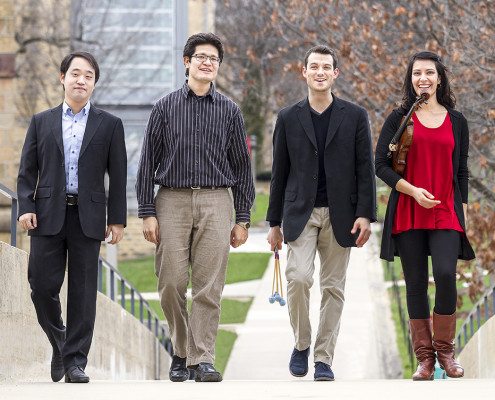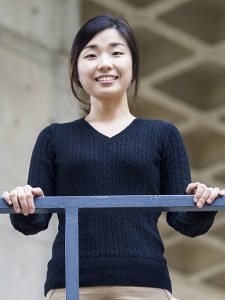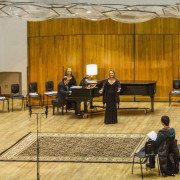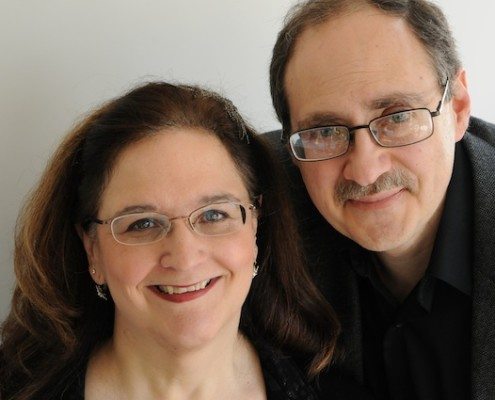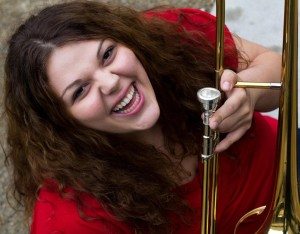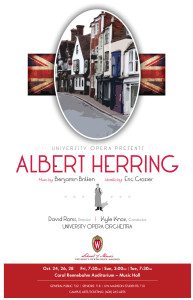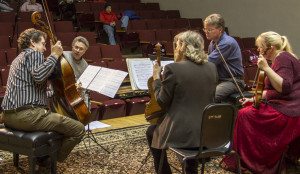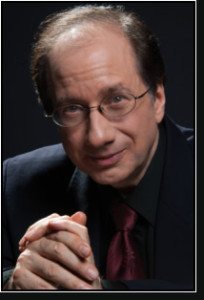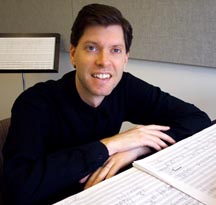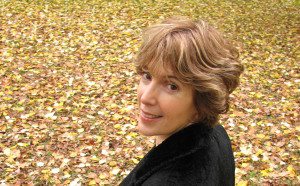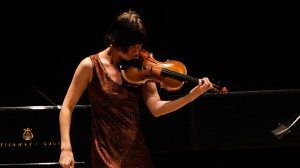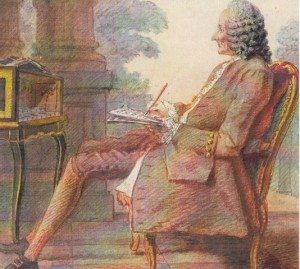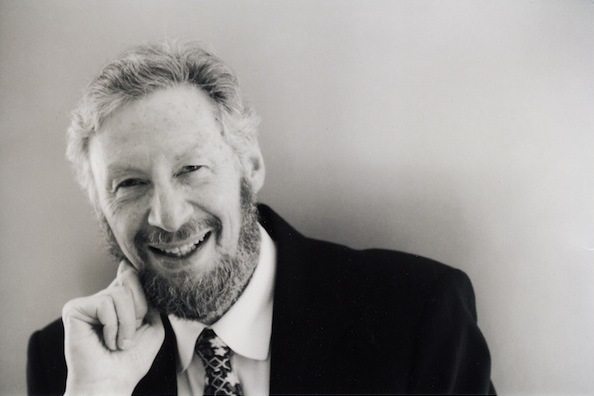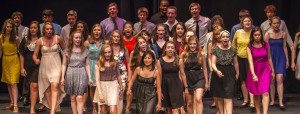UW-Madison alumni form 3/4 of new quartet in Door County
Executive director also an alumna
By Katherine Esposito
The first time UW-Madison’s Hunt Quartet played in Door County for Midsummer’s Music, a Door County summer chamber music festival, it was in response to an emergency.
The renowned Pro Arte Quartet had long been booked to play, but the quartet had to cancel. Midsummer’s artistic director James Berkenstock scrambled to fill the void.
David Perry, violinist with the Pro Arte, had a solution: Hire the Hunt, the graduate string quartet at UW-Madison. “David said that this particular configuration of the Hunt Quartet was superb,” says Berkenstock. “He said they already had a program and would do a great job.”
Subbing for the famous, seasoned quartet created undeniable pressure, recalled former Hunt violinist Vinicius (Vini) Sant’Ana. “The audience expected a world-class performance,” he said. “We were aware of that. So we tried our best, and it was one of our best performances.”

The Griffon String Quartet. L-R: Roy Meyer, Ryan Louie, “Vini” Sant’Ana, and Blakeley Menghini. Photograph by Ben Menghini.
The audience at Sturgeon Bay’s United Methodist Church was thrilled, and so were Berkenstock and MSM’s executive director, Allyson Fleck, who received her doctorate at UW-Madison in viola. It was the musicians’ youth, their vivacity, their clear rapport with each other, that snagged attention. It was something that felt new and special. Following one more Hunt performance in Door County, Berkenstock and Fleck had an idea: why not see if the quartet would like to remain together after graduating to become a permanent presence in Door County?
They began to brainstorm. They teamed up with Green Bay’s East High School Fine Arts Institute and De Pere’s St. Norbert College to mull over the idea of a three-year string quartet residency. They started making the rounds to meet with community leaders, foundations, and interested individuals to develop plans and seek funding. “The alignment with programs already in progress or being planned at the Fine Arts Institute and at St. Norbert seemed so perfect and propitious,” said Berkenstock. Only two of the Hunt Quartet members were able to make the commitment (violinist Sant’Ana and violist Blakeley Menghini), as former Hunt cellist Kyle Price leads a different arts enterprise, and violinist Chang-En Lu had not yet finished his degree program at UW-Madison. So they tapped Roy Meyer, an alumnus violinist who studied with David Perry and Ryan Louie, a cellist who earned a master’s degree at the Cleveland Institute of Music.
Now named the Griffon Quartet to honor a three-century-old Great Lakes shipwreck legend, the four regularly venture around the Door Peninsula and Brown County, beguiling audiences with classical quartet music designed to charm adults and kids alike. All fall, the quartet played a host of venues ranging from libraries to senior centers, to churches, at the local YMCA, the Boys & Girls Club, and in businesses and restaurants. In December, so many people attended a holiday concert at the Kress Pavilion in Egg Harbor that even after adding dozens of chairs to the hall, at least 40 people stood to hear the music spilling over into the lobby.
But entertainment is only a partial goal: the Griffon Quartet is also designed to bridge a void in Door and Brown counties left when the century-old Green Bay Symphony folded and the public schools all but eliminated strings education. For this, the Hunt Quartet helped provide a model.
At the Mead Witter School of Music, the on-going Hunt Quartet, supported by longtime donor Dr. Kato Perlman, the Madison Symphony Orchestra and the School of Music, is tasked with visiting elementary school children to inspire a love of music. Six schools participate in the Up Close and Musical program, and the quartet visits each school four times, showing children the basics of melody, rhythm, and expression. In Door County, the mission of the Griffon Quartet will be similar, but enlarged to include lessons, concerts, classroom presentations, involvement with seniors in a memory-oriented program called “B Double Sharp,” and impromptu appearances wherever appropriate and needed.
“The whole thing grew and expanded,” said Berkenstock. “The more we worked on it, the more we realized how potent this could be in northeast Wisconsin. There’s a lot missing, from a cultural standpoint.”
Fundraising “is now ramping up,” he adds.

Allyson Fleck
Fleck is optimistic about the future of the Midsummer’s string residency program. “There are so many opportunities out there,” she says. “I know our project is worthy.”
For violist Blakeley Menghini, who discovered her calling as a teacher after two years in the Hunt Quartet, it’s a dream come true. “While earning my graduate degrees, I fell in love with teaching,” she writes. “And during my two years in the Hunt Quartet, it grew difficult to imagine my life without the string quartet. Thanks to Midsummer’s Music, we are not only able to imagine that life, but are living it.”
Learn more about the Griffon String Quartet, including full biographies and spring schedule.
https://www.midsummersmusic.com/the-griffon-string-quartet/
About Midsummer’s Music Festival
Midsummer’s Music Festival is a chamber music ensemble featuring world-class musicians from organizations such as the Lyric Opera of Chicago, Pro Arte Quartet, Aspen Music Festival, and faculty of quality universities throughout the Midwest. Midsummer’s Music performs in intimate and casual settings throughout Door County, including art galleries, resorts, museums, churches, and private homes. The Festival was co-founded in 1990 by Jim and Jean Berkenstock, long-time Door County summer residents and principal orchestral players with the Lyric Opera of Chicago. Their summer festival runs from mid-June to mid-July, with six additional events during the Labor Day holiday. In addition, we sponsor programs such as the Pro Arte Quartet, the Chicago Early Music Consort with “A Renaissance Christmas,” and our exceptional string quartet with Haydn’s “The Seven Last Words” around Easter.
The 2019-2020 Hunt Quartet will perform on April 18, 2019 at 6:30 PM in Morphy Hall.
Current members are Chang-En Lu, violin; Ava Shadmani, violin; Fabio Saggin, viola; and Alex Chambers-Ozasky, cello. Repertoire will be posted soon.
https://www.music.wisc.edu/event/the-hunt-quartet/













